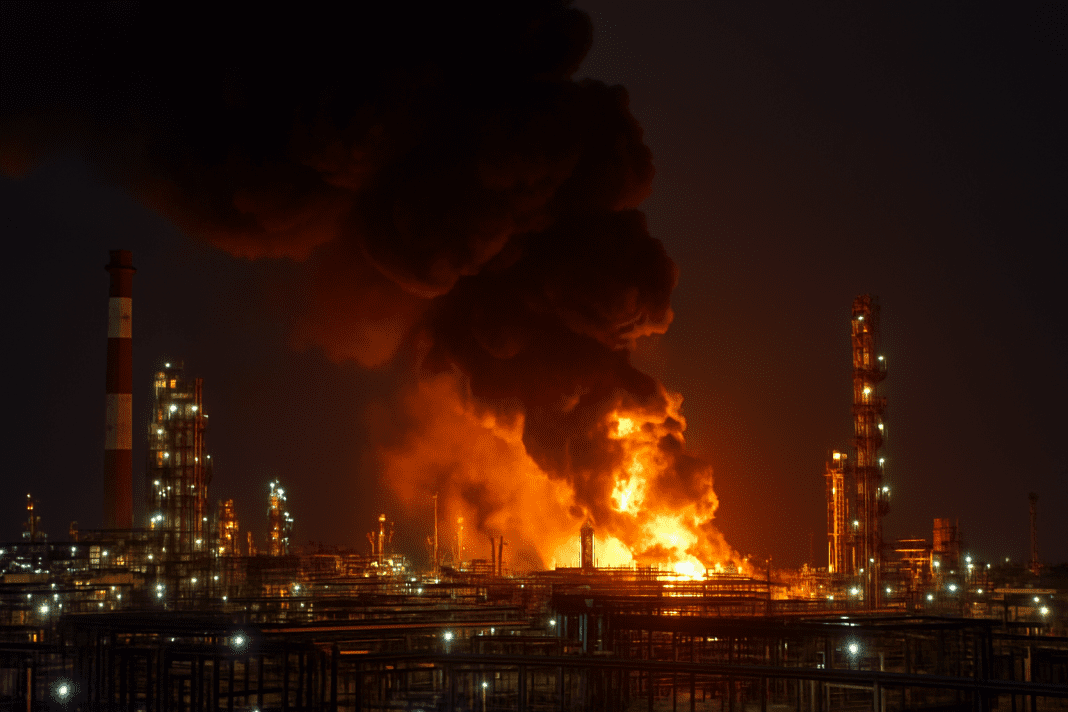Ukraine’s military has claimed responsibility for an overnight strike on the Saratov Refinery, a major crude-oil processing facility in Russia’s Volga region. According to Ukraine’s General Staff, explosions occurred near the plant, followed by a fire that caused significant disruption. Ukrainian authorities added that the full extent of the damage is still being assessed, and further details are expected as investigations continue.
Ukraine Claims Overnight Strike on Saratov Refinery
The claim has not been independently verified by international news agencies. Rosneft PJSC, Russia’s largest oil producer and the owner of the Saratov Refinery, did not immediately respond to requests for comment. The absence of confirmation underscores the challenges of obtaining accurate information from industrial and military areas during ongoing conflicts.
The Saratov Refinery is a vital part of Russia’s energy network, supplying gasoline and diesel to the European regions of the country where most of the population lives. With a design processing capacity of around 140,000 barrels of crude oil per day, the facility plays a central role in domestic fuel distribution. The refinery also supports industrial energy needs and local transportation networks, making it a strategically important target.
Ukraine pounds Russia’s energy network, striking 8-N oil station and Ilsky oil refinery
The location of the Saratov Refinery in the Volga region allows it to connect central oil production zones with densely populated urban areas. Its disruption could affect fuel availability across multiple regions. The strike highlights Ukraine’s focus on targeting energy infrastructure to impact fuel supply and the broader Russian energy system, underscoring the strategic importance of facilities like the Saratov Refinery in the ongoing conflict.
Intensified Drone Attacks Target Russian Energy
Over the past month, Ukrainian forces have intensified attacks on Russian energy infrastructure, including refineries, oil terminals, and pumping stations. Kyiv has said these operations aim to limit fuel supplies reaching the front lines and disrupt Russian military operations.
Last week, Ukrainian drones reportedly hit Russia’s largest Baltic oil terminal in Primorsk. There were also claims of strikes on pumping stations connected to another key Baltic hub, the Ust-Luga terminal. Repeated attacks on refineries like the Saratov Refinery have worsened Russia’s seasonal fuel shortage, forcing the government to ban gasoline exports and divert diesel to domestic consumption.
Analysts estimate that strikes since early August have reduced Russia’s refining capacity by around 300,000 barrels per day. This represents more than 5% of the country’s total active oil-processing capacity. Ukraine’s strike affected the Saratov Refinery, underscoring its importance in Russia’s energy network.
The Domino Effect: How Western Sanctions Shake Up the Russian Oil Refinery Sector
Saratov Refinery’s Role in Russia’s Energy Supply
The Saratov Refinery has long been one of Russia’s important oil-processing plants. It supplies a significant portion of gasoline and diesel to the western regions of Russia, which are heavily populated. Disruptions at the Saratov Refinery can affect fuel distribution across multiple regions, highlighting the refinery’s strategic importance.
Rosneft, the owner of the Saratov Refinery, operates multiple refineries across Russia, but the Saratov facility is notable for its location in the Volga region, connecting central oil production to urban demand. The refinery’s operations support both domestic transportation needs and industrial energy requirements.
Repeated attacks on the Saratov Refinery indicate a tactical focus by Ukraine on facilities that have a direct impact on Russia’s fuel availability. Each strike not only damages infrastructure but also adds pressure to manage supply shortages.
Global Reactions and Sanctions Considerations
The overnight strike comes amid growing international pressure on Russia. The Group of Seven (G7) nations are reportedly preparing a new sanctions package aimed at curbing Russian oil exports.
US President Donald Trump has said he is ready to impose “major” sanctions on Russian oil buyers, including India and China, if other NATO nations take similar steps. However, implementing such measures would be challenging for the European Union, as many EU countries, including Germany, rely heavily on exports to these Asian economies.
🔥 Explosive Ukranian drone strike ignites massive fire at Saratov oil refinery in Russia
The Saratov Refinery, as part of Russia’s broader energy infrastructure, is directly linked to these international discussions. Analysts note that attacks on facilities like the Saratov Refinery, combined with potential sanctions, could further impact fuel distribution and the Russian domestic market.
Overall, the claim by Ukraine highlights the strategic importance of energy infrastructure in the ongoing conflict. The Saratov Refinery, targeted in the latest strike, remains a critical facility for fuel supply, underlining the continued focus on disrupting Russia’s energy capabilities.
